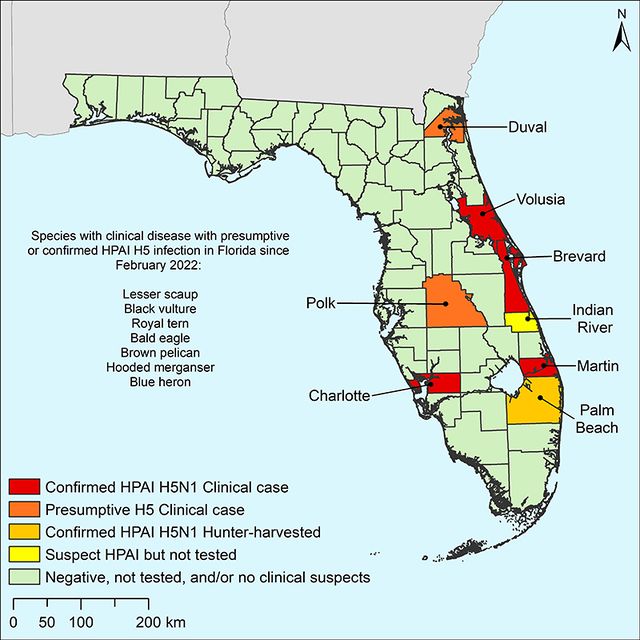IRLNews:Avian Influenza Confirmed in Florida
The FWC is currently investigating bird mortalities in Brevard, Indian River and Volusia counties believed to be caused by HPAI. This strain has been documented in the United States since 2021 and was detected in hunter-harvested blue-winged teal in Palm Beach County in January 2022.
To prevent the spread of HPAI, the public should avoid handling sick or dead wildlife, prohibit the contact of domestic birds with wild birds, and report wild bird mortalities to FWC so deaths can be investigated. Please be advised that because HPAI is not treatable and is easily transmitted in wild birds, some wildlife rehabbers may not be accepting these animals at this time.
The FWC is working closely with the United States Department of Agriculture-Wildlife Services, Florida Department of Agriculture and Consumer Services, University of Florida, National Wildlife Health Center, Southeastern Cooperative Wildlife Disease Study, Florida Department of Health, and wildlife rehabilitators to investigate mortality events involving wild birds.
Recommended Precautions
FWC asks the public not to handle sick or dead birds, however, we strongly encourage the reporting of all sightings of dead birds to the bird mortality database. Wild birds involved in die-offs will be collected, examined, and tested for Avian Influenza, West Nile Virus, Exotic Newcastle's Disease, and/or other infectious agents of concern.
The HPAI virus is not easily transmissible from birds to people but health officials are concerned it could develop into another form that spreads readily from person to person, triggering a global disease outbreak known as a pandemic. While it is extremely unlikely that hunters or people feeding birds could contract the HPAI virus from wild birds in Florida, the following common-sense precautions are always recommended to reduce the risk of contracting any disease from wildlife.
Additional Resources
Florida Fish and Wildlife Conservation Commission: MyFWC.com/AvianInfluenza
Florida Department of Health: floridahealth.gov/diseases-and-conditions/influenza/index.html
Florida Department of Agriculture and Consumer Services: fdacs.gov/Consumer-Resources/Animals/Animal-Diseases/Avian-Influenza
U.S. Department of Agriculture Animal and Plant Health Inspection Service: aphis.usda.gov/aphis/ourfocus/animalhealth/animal-disease-information/avian/avian-influenza/defend-the-flock-hpai

